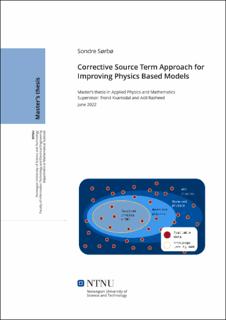| dc.contributor.advisor | Kvamsdal, Trond | |
| dc.contributor.advisor | Rasheed, Adil | |
| dc.contributor.author | Sørbø, Sondre | |
| dc.date.accessioned | 2023-01-12T18:19:32Z | |
| dc.date.available | 2023-01-12T18:19:32Z | |
| dc.date.issued | 2022 | |
| dc.identifier | no.ntnu:inspera:104646180:36854232 | |
| dc.identifier.uri | https://hdl.handle.net/11250/3043176 | |
| dc.description.abstract | Pålitelege prediksjonsmodelleringsteknikkar er kritisk for eit utal av oppgåver i industrien.
Med ein stadig pågåande teknologisk revolusjon innen store datamengder, vert tradisjonelle metodar basert på fysiske beskrivingar utfordra av det nyare maskinlæringsparadigmet. Samstundes nøler mange industriar med å lita på modellar basert på ukjende berekningar, med god grunn. Sjølv om desse modellane i atskillege tilfelle gjev meir nøyaktige prediksjonar, og krev mindre utrekning når modellane fyrst har vorte trena, så kjem dei med betydelege ulemper når det gjeld pålitelegheit og generaliseringsevner.
Hybrid analyse og modellering siktar på å kombinera idear frå fysikkbaserte og datadrivne modellar til meir robuste hybride modellar. I denne oppgåva utfører me ei rekkje eksperiment der me modellerer varme og elastisitet, ved å nytta ein av desse hybride metodane, CoSTA (frå engelsk "corrective source term approach"), for å korrigera for modelleringsfeil som stammar frå ignorerte dimensjonar, linearisering, ukjende kjeldeledd eller berre frå diskretisering av likningane.
Me viser at CoSTA gir mykkje meir nøyaktige resultat enn tilsvarande fysikkbaserte eller datadrivne modeller, òg når ein generaliserer til situasjonar som er kvalitativt ulike frå treningsdataene. Sjølv om CoSTA-modellar har vilkårlege variasjonar, argumenterer me for at prediksjonane er meir enn konsistente nok til å utklassa både dei fysikkbaserte og dei datadrivne modellane. | |
| dc.description.abstract | Reliable predictive modelling techniques are paramount to innumerable industry objectives. With the ever emerging big data revolution, traditional methods based on physical descriptions are being challenged by the newer machine learning paradigm. Still, many industries are reluctant to trusting black box models, with good reasons. Although these models in numerous occasions offer more accurate predictions at a lower computational cost in the online phase of the model, they come with significant disadvantages in terms of trustworthiness and generalizability.
Hybrid analysis and modelling aim to combine ideas from physics based and data driven modelling into more robust hybrid models. In this thesis we conduct a series of experiments on modelling heat and elasticity using one of these hybrid methods, the corrective source term approach (CoSTA), to correct for various modelling errors stemming from ignored dimensions, PDE linearization, unknown source terms, or just from discretization of the equation.
We show that CoSTA produce significantly more accurate results than its counterpart physics based or data driven models, also when generalizing to situations qualitatively different from the training data.
Although CoSTA models has random variations, we argue that the predictions are more than sufficiently consistent to outclass both the physics based and the data driven models. | |
| dc.language | eng | |
| dc.publisher | NTNU | |
| dc.title | Corrective Source Term Approach for Improving Physics Based Models | |
| dc.type | Master thesis | |
